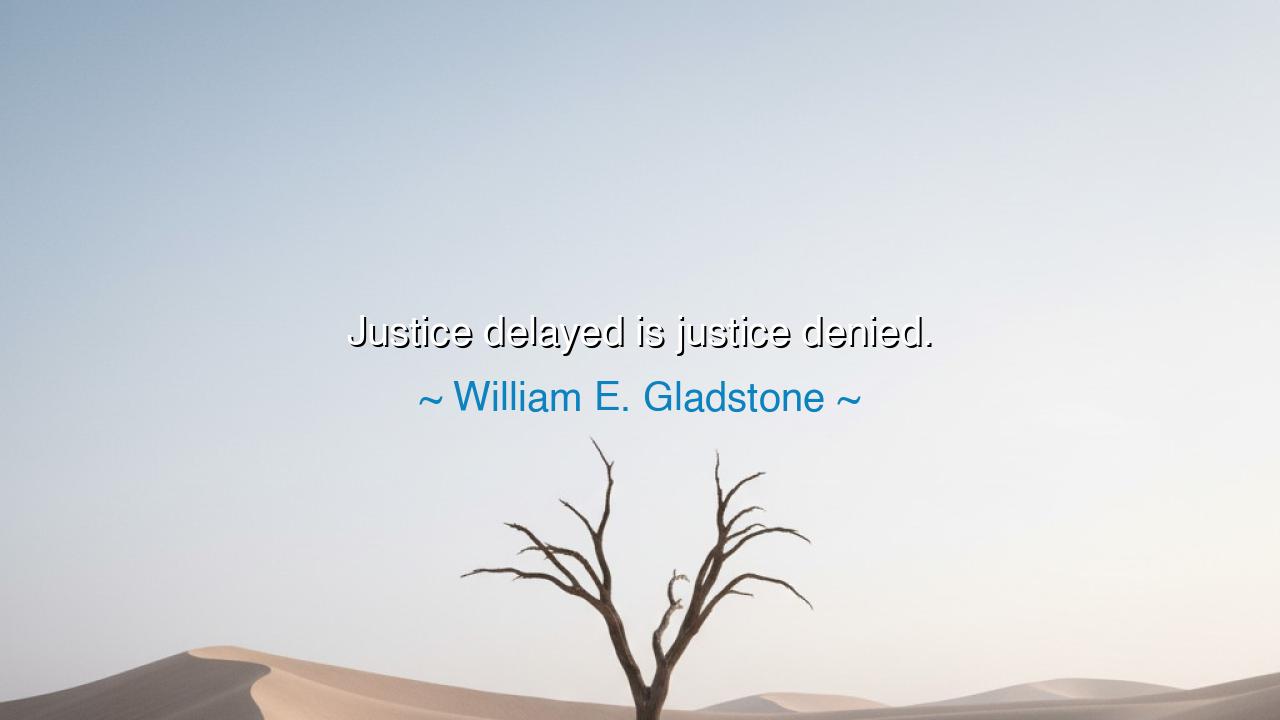
Justice delayed is justice denied.






William E. Gladstone, the great British statesman of the nineteenth century, once declared with piercing gravity: “Justice delayed is justice denied.” These words burn like fire in the hearts of all who have ever waited in anguish for fairness, only to find that delay itself becomes its own form of cruelty. Gladstone’s saying is not a mere remark on the slowness of courts—it is a cry against the betrayal of justice by neglect, hesitation, or indifference. For he knew, as all wise men know, that time is not neutral. When justice is postponed, the innocent suffer, the guilty rejoice, and the very purpose of law is undone.
The meaning of this phrase lies in its simplicity. Justice is not only about verdicts and laws—it is about timely relief for those who suffer. If the victim waits endlessly for redress, if the oppressed languish in chains while courts stall, then justice has already failed them. For to wait in suffering while truth is withheld is to endure injustice twice: once from the wrong itself, and again from the system that promises but withholds remedy. Gladstone reminds us that justice without urgency is no justice at all—it is an illusion, a mockery.
The origin of this principle can be traced back before Gladstone, to legal traditions and moral philosophies that spanned centuries. The idea appears in the Magna Carta’s promise of swift justice, and later in the writings of English jurists like Sir Edward Coke. Yet Gladstone gave the phrase its enduring power, speaking it into a political age when the machinery of empire and law often moved slowly, sometimes crushing the very people it claimed to protect. His voice gave clarity to an ancient truth: that delay itself is denial.
History bears witness to the weight of this saying. Consider the long fight for civil rights in America. Generations of Black citizens petitioned for freedom, equality, and dignity, yet were met with endless delays—laws promised but not enforced, rights written but not honored. The cry of “wait” became the cruelest word, as Martin Luther King Jr. would later echo: “justice too long delayed is justice denied.” Only when urgency broke through delay—when marches, protests, and sacrifice forced change—did the law begin to move toward true justice. Here Gladstone’s principle was fulfilled in living fire.
There is a deeply emotional power in this teaching. To wait for justice is to live in suspended torment, where each day of delay deepens the wound. For the poor, the marginalized, the falsely accused, or the silenced, time itself becomes a weapon wielded by those who benefit from inaction. Gladstone’s words speak to every broken heart that has yearned for fairness and found only excuses, every victim whose cry has been muffled by the slowness of systems. His saying gives voice to their anguish, and demands that the conscience of society never accept delay as harmless.
To future generations, this quote is both warning and command. The warning is that justice, if left to languish, rots into injustice. The command is that those entrusted with power—judges, lawmakers, leaders, and even ordinary citizens—must act swiftly when confronted with wrong. To hesitate is to harm, to stall is to betray. Justice must move with the urgency of compassion, or it becomes a shadow of itself.
The lesson is clear: in your life, do not delay in standing for truth. If you see wrong, speak against it; if you have power to aid, act without hesitation. Practically, this means supporting reforms that make courts accessible and efficient, defending the vulnerable from endless delay, and refusing to allow bureaucracy to silence the cry for fairness. In daily choices, it means not postponing acts of kindness, apology, or defense of what is right. For every delay allows injustice to grow stronger.
Thus Gladstone’s words endure: “Justice delayed is justice denied.” Let them be written not only in the books of law, but in the hearts of all who love righteousness. For justice is not only what we declare—it is what we deliver, swiftly and truly. And when we deliver it without delay, we stand as guardians of both law and humanity, preserving the dignity of those who wait, and proving that justice, when timely, is the very breath of freedom.






AAdministratorAdministrator
Welcome, honored guests. Please leave a comment, we will respond soon